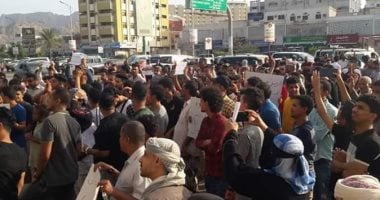The occupied provinces are witnessing widespread popular protests against the mercenary government loyal to Saudi-led aggression coalition, with the continued deterioration of the local currency, suspension of salaries, and rising prices.
Political and popular movements have begun for a new uprising against the authorities loyal to the Saudi and Emirati occupation.
Southern parties and coalitions have called on citizens to participate in major protests organized by the Southern Workers’ Unions at Al-Arodh Square in the Khormaksar district, today, Monday, in rejection of the collapse of living conditions.
On Sunday, the workers of the Gulf of Aden Ports Corporation organized a protest in front of a court in the city of Aden, southern Yemen, to demand justice and the return of their compensatory lands.
The protesters raised banners in front of the court that included slogans calling for justice, including “We, the people of Aden, will not be subject to favoritism and under the authority of land exploiters” and “No to procrastination and delay; we are the rightful owners, and we will seize our rights by force of law,” in addition to demands to hold accountable those responsible for manipulating the lands.
During the protest, the participants affirmed their adherence to their rights to the lands that were allocated to them in the nineties, before they were confiscated for the benefit of the free zone. They pointed out that they possess official documents proving their entitlement to these lands.
For its part, the Gulf of Aden Ports Corporation Workers Union announced its refusal to attend the session after submitting a request for the division to be dismissed from considering the case, according to a statement issued last Tuesday.
Meanwhile, hundreds of citizens went out to the streets, in an angry protest in the center of the city of Taiz, which is under the control of the pro-aggressionauthorities, denouncing the collapse of the currency and the deterioration of economic conditions and public services.
The protesters, in what they called the “Revolution of the Hungry,” demanded an improvement in living conditions and a wage structure that is commensurate with the living conditions, in accordance with the law, in clear defiance of the authorities’ measures to ban demonstrations.
The demonstrators considered the circular issued by the authorities to ban demonstrations an attempt to restrict freedoms without mentioning the suffering of citizens, stressing their continuation of the demonstrations until all their demands are met.
Human rights sources in the city indicated that elements loyal to the aggression carried out a wide-scale kidnapping campaign targeting participants and confiscated banners calling for an end to the state of failure, corruption and currency collapse.
The sources reported that the kidnapping campaign targeted a number of union representatives and youth participating in the protests, and their personal phones were confiscated, indicating that the demonstrators raised banners demanding the overthrow of the conference leader, “Nabil Shamsan,” who was appointed governor of Taiz by the aggression.
The local union in Taiz accused the coalition of imposing a systematic starvation policy against citizens and employees alike, amid demands to expel the coalition and end the people’s suffering.


















